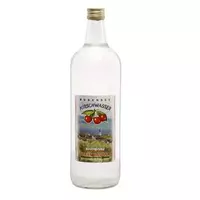Kirsch

A strong alcoholic drink kirschwasser or kirsch is considered traditional for the population of the eastern territories of Germany, and in addition to France. Translated from German, the original name of the drink Kirschwasser sounds like "cherry water. " A kirshwasser is like a rach the case when by name it is possible to determine the composition of the initial ingredients that are used to produce the drink.
German kirschwasser refers to strong alcoholic beverages that are produced by distillation of fermented wort. Moreover, the wort is made of cherry. During the production of wort, ripened black cherry berries are used for the further production of the famous kirshwasser. Interestingly, according to an old recipe, a kirshwasser is made from whole cherries, i. e. unpeeled from seeds.
The first mention of the kirschwasser, preserved in historical documentation, dates back to the 16th century. Eastern German lands have long been famous for their rich crops of very sweet varieties of sweet cherries with small bones. Over time, people began to try to produce a drink from cherries, which is currently part of the "golden fund" of the drinking culture of Germany, as well as a number of other European states, for example, France, Switzerland or Belgium.
It is worth noting that during distillation, the cherries are fermented whole. It is cherries that give the kirshwasser an original and unique taste with pronounced almond notes. It is interesting that in the process of making a kirshwasser, however, as in the case of all other drinks obtained on a fruit and berry basis, the stage of aging in wooden barrels is missed.
Professionals claim that clay jugs or glass vats are simply ideal for aging a kirschwasser. When the kirschwasser is aged in glass or clay containers, the beverage undergoes natural evaporation processes, which significantly improves both the taste and aroma characteristics of the product. However, a decrease in the degree of the drink can be considered a disadvantage of such exposure.
In addition, during aging, the kirshwasser does not change its original color. Kirschwasser is eaten like other strong alcoholic beverages. Special popularity. Kirschwasser is used by bartenders, who often use the drink to make many world-famous cocktails.
Perhaps the most often made drink in which the kirshwasser is included can be considered a cocktail with the poetic name Rose. In addition to kirschwasser, this cocktail includes Cherry Brandy liquor. Often, the kirschwasser is mixed with liqueurs or champagne.
kirshwasser 235 kCal
Energy value of the kirschwasser (Ratio of proteins, fats, carbohydrates - ju):
Proteins: 0.1 g (~ 0 kCal)
Fats: 0.1 g (~ 1 kCal)
Carbohydrates: 0.4 g (~ 2 kCal)
Energy ratio (bj | y): 0% | 0% | 1%
 Español
Español Français
Français Português
Português Русский
Русский 简体中文
简体中文 繁體中文
繁體中文 日本語
日本語 한국어
한국어 العربية
العربية Türkçe
Türkçe Қазақ
Қазақ Deutsch
Deutsch Italiano
Italiano Українська
Українська
